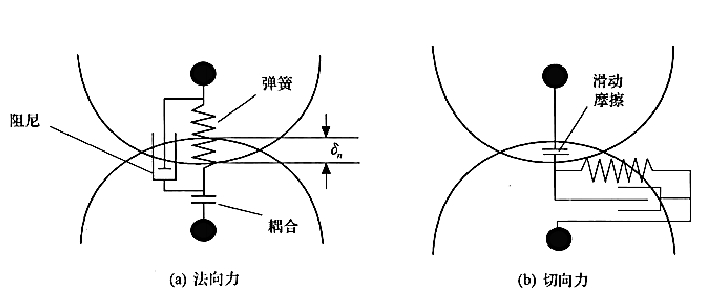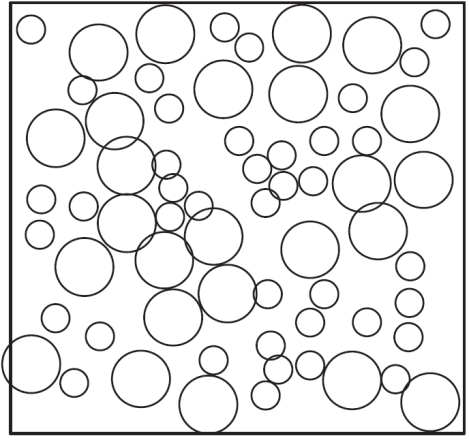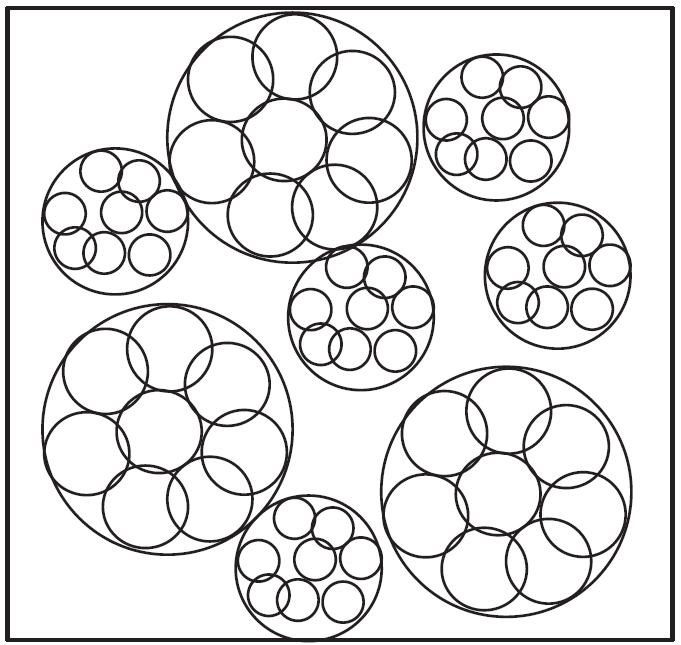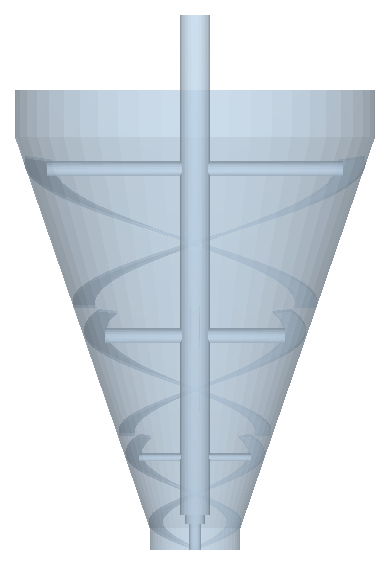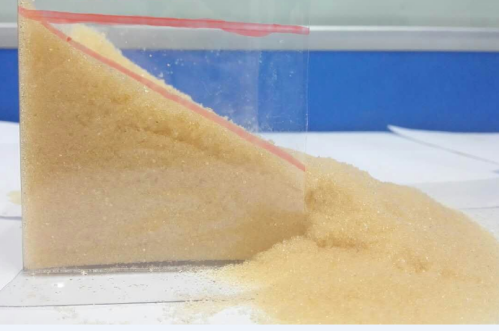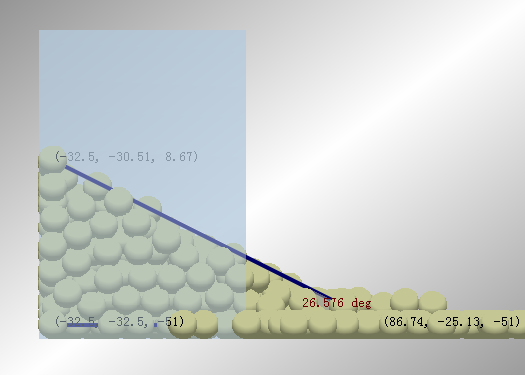核电站废树脂搅拌干燥模拟毕业论文
2020-06-20 19:22:48
摘 要
在核电站废树脂的减容处理过程中,废树脂的干燥是不可或缺的一步。锥形搅拌干燥器可用于废树脂的干燥处理。干燥技术不仅使废树脂的体积和质量大大降低,而且还有利于废树脂的后续处理和处置。
本课题采用离散元方法对锥形搅拌干燥器处理废树脂颗粒的过程进行数值模拟。通过颗粒速度矢量、颗粒运动轨迹、颗粒温度分布三个方面分析两种搅拌桨(单桨和双桨)以及颗粒干湿两种状态的搅拌效果。
EDEM模拟结果表明,在湿树脂状态下,双桨的结构效率是要优于单桨结构的,且双桨搅拌时的最优转速区间为20r/min~30r/min;双桨同一搅拌转速下,干颗粒与湿颗粒在运动轨迹上无明显的差异,而干颗粒的温度分布均匀程度却是低于湿颗粒的。因此,在搅拌干燥的后期可适当地提高转速,以增加干颗粒的温度分布均匀度。
关键词:废树脂 搅拌 干燥 离散元
The simulation of stirring process for drying the waste resin from Nuclear power plant
Abstract
In the waste resin process reduction for nuclear power plant, waste resin drying is an indispensable step. The conical stirrer can be used for drying the waste resin. Drying technology not only greatly reduces the volume and quality of waste resin, but also conducive to the subsequent treatment and disposal of waste resin.
In this paper, the process of treating waste resin particles by cone-shaped stirrer is numerically simulated by discrete element method. The stirring effects of two kinds of stirring blades (the single and the double) and two kinds of dry and wet conditions were analyzed by particle velocity vector, particle trajectory and particle temperature distribution.
The EDEM simulation results show that the structure efficiency of the double is better than that of the single-blade structure in the wet resin condition, and the optimum rotation speed range is 20 r/min ~ 30 r/min for the double .Stirring under the double, there is no significant difference between the dry particles and the wet particles in the movement trajectory at the same stirring speed, but the uniformity of the temperature distribution of the dry particles is lower than that of the wet particles. Therefore, the rotational speed can be appropriately increased at the later stage of the stirring and drying to increase the temperature distribution uniformity of the dry particles.
Key Words: Waste resin; Stir; Dry; Discrete element
目 录
摘要…………………………………………………………………………………I
ABSTRACT………………………………………………………………………II
第一章 绪论………………………………………………………………………1
1.1 前言…………………………………………………………………………1
1.2 搅拌干燥概述………………………………………………………………2
1.2.1 锥形搅拌干燥器……………………………………………………2
1.2.2 树脂颗粒干燥模拟…………………………………………………3
1.2.3 不同搅拌转速下的对比分析………………………………………4
1.3 搅拌干燥模拟工况…………………………………………………………4
第二章 EDEM模拟计算…………………………………………………………6
2.1 软件概述……………………………………………………………………6
2.2 颗粒接触模型的选择………………………………………………………6
2.2.1 颗粒间的相互作用…………………………………………………6
2.2.2 颗粒简化模型的选取………………………………………………7
2.2.3 颗粒接触模型的选取………………………………………………7
2.3 几何模型的建立……………………………………………………………8
2.3.1 颗粒几何模型………………………………………………………8
2.3.2 锥形干燥装置几何模型……………………………………………9
2.4 参数设置……………………………………………………………………10
2.4.1 堆积角实验与接触参数设置………………………………………10
2.4.2 传热参数设置………………………………………………………12
2.4.3 仿真参数设置………………………………………………………13
第三章 模拟结果分析…………………………………………………………14
3.1 单桨与双桨搅拌效果对比分析……………………………………………14
3.1.1 颗粒速度矢量与运动轨迹分析……………………………………14
3.1.2 颗粒温度分布分析…………………………………………………15
3.1.3 搅拌均温性的定量评价……………………………………………16
3.1.4 小结…………………………………………………………………17
3.2 湿颗粒不同转速搅拌效果对比分析………………………………………17
3.2.1 颗粒速度矢量与运动轨迹分析……………………………………17
3.2.2 搅拌混合度分析……………………………………………………22
3.2.3 颗粒温度分布分析…………………………………………………24
3.2.4 搅拌均温性的定量评价……………………………………………30
3.2.5 小结…………………………………………………………………37
3.3 干颗粒不同转速搅拌效果对比分析………………………………………37
3.3.1 颗粒速度矢量与运动轨迹分析……………………………………37
3.3.2 颗粒温度分布分析…………………………………………………39
3.3.3 搅拌均温性的定量评价……………………………………………41
3.3.4 小结…………………………………………………………………42
第四章 结论………………………………………………………………………43
参考文献…………………………………………………………………………45
致谢…………………………………………………………………………………47
第一章 绪论
1.1 前言
近些年来,为适应环境友好型社会的发展,解决化石燃料燃烧引起的环境污染问题,我国正大力发展核电这一清洁能源。随着核电的迅速发展,一系列放射性废物也随之产生,放射性废树脂便是其中之一。在核电站中,离子交换树脂常被用来净化放射性工艺废水[1-2],装载了放射性核素(主要核素为137Cs和60Co等)的废树脂一般不会被再生重复使用[3]。这些放射性废树脂应该得到安全妥善的处理、转运和处置,以避免其可能对环境造成的破坏。据估计,到2020年,我国所有核电站每年生成的废树脂将达126-196 m3[1],因此,开发合适的放射性废树脂处理和处置技术是非常必要的。
处理废树脂的方法主要包括: 固化法( 聚合物固化、水泥固化、沥青固化)、焚烧和湿氧化法、热压处理法、微生物转化处理法、高牢固性容器直接包装和洗脱处理等[2-8]。对于大多数的方法来说,废树脂的干燥都是必不可少的。例如,表1-1显示了一些国家放射性废树脂聚合物固化的主要情况[9-10],可以看到,大多数的聚合物固化处理技术都要求废树脂先经过沥水、干燥等操作,之后再对其做进一步的处理。考虑到废树脂自身的一些属性,核电站常选用锥形搅拌干燥器来搅拌干燥废树脂。
相关图片展示:
